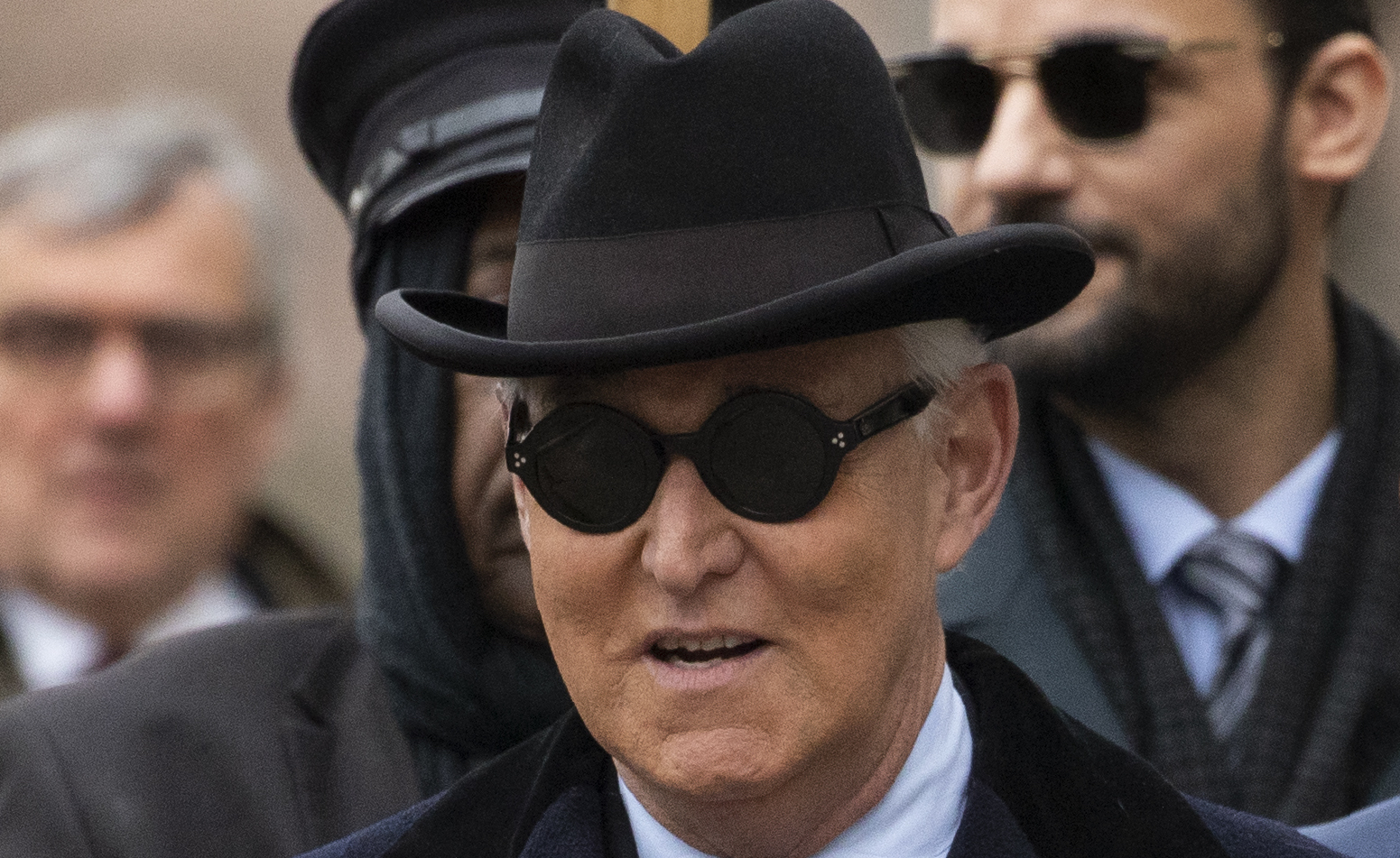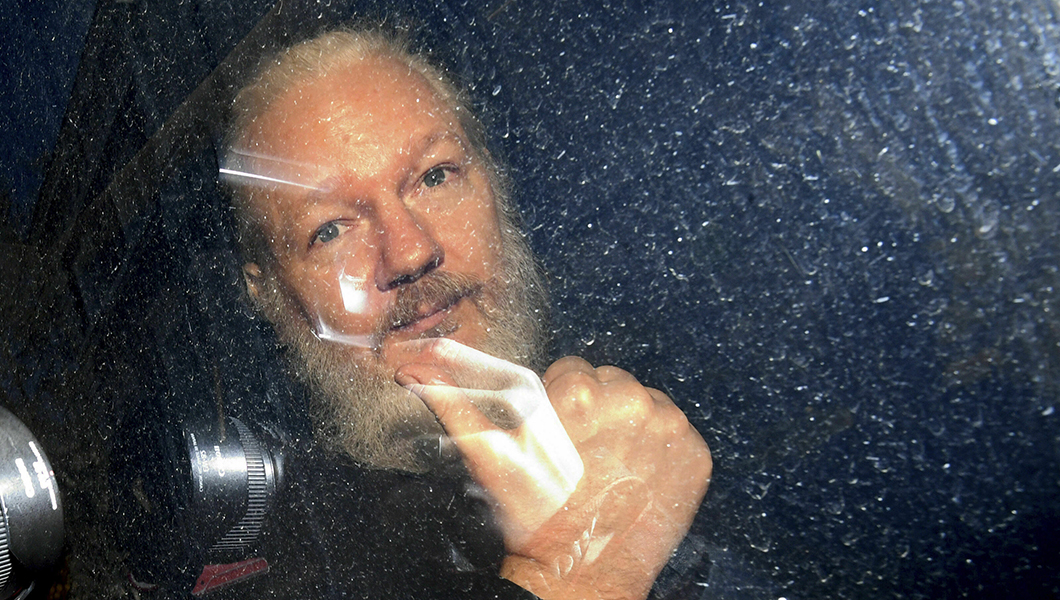The Justice Department released 33 search warrants stemming from the investigation of now-convicted Donald Trump associate Roger Stone, showing the searches began in the fall of 2017 and focused on Stone’s alleged outreach to WikiLeaks and Russia-linked accounts.
The records provide a new glimpse into the steps being taken by investigators in the case that began with the 2017 testimony by the self-described “dirty trickster” before the House Intelligence Committee, which was later roped into special counsel Robert Mueller’s Trump-Russia investigation. Mueller did not uncover any criminal conspiracy between the Kremlin and the Trump campaign, or any U.S. citizens.
The tranche of documents, spanning from August 2017 through January 2019 and totaling many hundreds of pages, were made available in a public filing signed by U.S. Attorney for D.C. Timothy Shea and Assistant United States Attorney Molly Gaston. The records were mostly unredacted, although some court-approved portions are still blacked out. The first few search warrants in the fall of 2017 focused on Stone’s personal accounts, with dozens of searches in 2018. The final two search warrants in January 2019 ended with the dramatic searches of Stone’s home and office in Florida.
Stone was arrested in January 2019 and was later found guilty in November of last year on five separate counts of lying to the House Intelligence Committee during its investigation into Russian interference about his alleged outreach to WikiLeaks, one count that he “corruptly obstructed” the congressional investigation, and another for attempting to intimidate a possible congressional witness, radio host Randy Credico.
The search warrants show Stone and WikiLeaks founder Julian Assange conversed with each other online in 2017.
Stone told an account dubbed “Target Account 1” in April 2017 that “I am [Julian Assange’s] only hope for a pardon.” Assange wrote back using “Target Account 2,” thanking Stone for an “ace article in InfoWars” and telling him that “U.S. intel engages in slight of hand.”
Stone wrote back in June 2017, saying “if the US government moves on you I will bring down the entire house of cards” and “with the trumped-up sexual assault charges dropped I don’t know of any crime you need to be pardoned for.”
In his reply, Assange said “between CIA and DOJ they’re doing quite a lot” and “the DoJ side that’s coming most strongly from those obsessed with taking down Trump trying to squeeze us into a deal.”
Stone wrote back: “I am doing everything possible to address the issues at the highest level of Government.”

The U.S. government is seeking Assange’s extradition from the United Kingdom on 17 charges, including under the Espionage Act. The WikiLeaks founder’s extradition hearing has been delayed due to the coronavirus outbreak.
Stone responded to the revelations on Tuesday night.
“Although there are private communications contained in the warrants, they prove no crimes,” Stone said in a lengthy statement on his website. “I have no trepidation about their release as they confirm there was no illegal activity and certainly no Russian collusion by me during the 2016 Election. There is, to this day, no evidence that I had or knew about the source or content of the Wikileaks disclosures prior to their public release.”
Stone added that “the search warrants and the affidavits used to support them released today clearly demonstrate the overreach of the Mueller investigation.”
The first search warrant against Stone was issued on Aug. 7, 2017, by Chief U.S. District Judge Beryl Howell, who authorized the FBI to search at least two of Stone’s Twitter accounts. Probable cause was explained in detail, but included “The 2016 Email Hack and Russia’s Use of ‘Guccifer 2.0’ and Wikileaks to Disseminate Hacked Information” and “Roger Stone’s Publicly Disclosed Interactions with Guccifer 2.0 and Wikileaks.” The next search warrant was issued on Sept. 11, 2017, and targeted Stone’s Hotmail account, and the follow-up warrant went after Stone’s Google account on Oct. 17, 2017. Dozens of searches followed, with the bulk of them throughout 2018.
The final two search warrants were issued on Jan. 24, 2019, and signed by U.S. Magistrate Judge Lurana Snow. The searches, as well as Stone’s arrest, happened the next day. One search warrant was issued for Stone’s Fort Lauderdale home; the other targeted his famously Nixon memorabilia-filled office in Oakland Park, Florida.
Mueller’s investigation “identified numerous links between the Russian government and the Trump campaign” but “did not establish that members of the Trump campaign conspired or coordinated with the Russian government in its election interference activities.” Mueller’s report said Russia’s Main Intelligence Directorate of the General Staff, or GRU, stole thousands of Democratic emails and distributed them through two GRU-operated fronts: the DCLeaks and Guccifer 2.0 websites. Mueller further reported that “the GRU units transferred many of the documents they stole from the DNC and the chairman of the Clinton Campaign to WikiLeaks.” The special counsel found DCLeaks and Guccifer 2.0 to be Russian conduits for communication with WikiLeaks.

U.S. District Judge Christopher Cooper in Washington, D.C., ruled in January that records stemming from the FBI’s 33 search warrants against Stone should be unsealed following a lawsuit by a coalition of media outlets.
The searches focused mainly on any and all documents related to WikiLeaks, Assange, and Russian interference in the 2016 presidential election. The warrants specifically named any documents showing communication between Stone and InfoWars conspiracy theorist Jerome Corsi, radio show host Randy Credico, Trump campaign CEO Steve Bannon, Trump campaign manager Paul Manafort, deputy Trump campaign manager Rick Gates, and Trump himself. The bureau also zeroed in on any communications related to the House or Senate intelligence committees or any discussions mentioning the FBI. The warrants targeted, among other things, Stone’s email accounts, his computers, his cellphones, and other electronics and any WhatsApp, Signal, and Wickr accounts.
Prosecutors told the court in February they recommended Stone receive up to nine years behind bars. But after Trump tweeted he “cannot allow this miscarriage of justice,” the Justice Department suggested a less severe sentence. The four line prosecutors on the case withdrew as the department walked back the “unduly high” sentence recommendation.
Attorney General William Barr denied the president’s tweet influenced the Justice Department’s actions, but Barr did complain that such tweets make “it impossible for me to do my job.”
“The prosecution was and is righteous,” Assistant U.S. Attorney John Crabb said during Stone’s sentencing hearing.
Earlier in April, Judge Amy Berman Jackson, an Obama-appointee who handled multiple cases stemming from Mueller’s investigation and presided over Stone’s November trial, denied Stone’s motion for a new trial following allegations the juror foreperson misled the court to conceal a bias toward him.
“The defendant has not shown that the juror lied; nor has he shown that the supposedly disqualifying evidence could not have been found through the exercise of due diligence at the time the jury was selected,” Jackson said, adding: “The motion is a tower of indignation, but at the end of the day, there is little of substance holding it up.”
The controversy surrounding juror Tomeka Hart, a former Democratic congressional candidate, kicked into high gear in February when it was revealed she shared anti-Trump posts on social media, which resulted in Stone’s lawyers filing a motion for a retrial prior to his sentencing.
Hart tweeted about Trump dozens of times and was critical of the president and his supporters, with some comments regarding people under scrutiny in Mueller’s investigation. Hart’s tweets included a few about Russian election interference and allegations of Trump-Russia collusion. Hart also shared an article in January that mentioned Stone and said it was “brought to you by the lock her up peanut gallery” and retweeted a tweet from a CNN commentator, which criticized Republicans who were upset with his arrest.
“The trial is over, and a verdict — which was based largely on the defendant’s own texts and emails, and was amply supported by this undisputed evidence — has been returned,” Jackson said.
Stone was sentenced to 40 months for obstruction of justice and 12 months for the other five counts to be served concurrently. Stone also received a $20,000 fine and 24 months of supervised release when he gets out. Stone is expected to appear for his prison sentence in the coming days, although questions remain about whether it might be delayed for reasons involving the coronavirus pandemic. Stone has repeatedly said he hopes for a pardon from Trump and is also weighing whether to appeal his conviction.
Trump has decried Stone’s sentencing as a “miscarriage of justice,” but has thus far refused to grant clemency for him.
During Stone’s trial, the jury heard testimony from Gates, the former deputy Trump campaign manager and business partner of campaign chairman Paul Manafort, who strongly suggested that Stone told Trump about supposed upcoming WikiLeaks releases. Bannon testified the Trump campaign saw Stone as the campaign’s “access point” to WikiLeaks.

